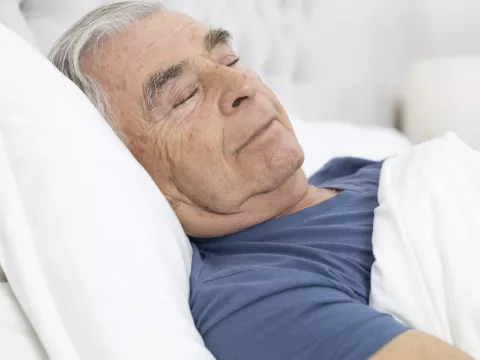- AdventHealth

There's nothing better than lying in bed after a long day and being able to rest, recuperate and start the next day refreshed.
But when the act of lying in bed causes aches and pains, you're not only compromising your sleep, but you're guaranteed to wake up with pain that can put a huge damper on your day and who has time for that? By making a few adjustments to your sleeping position, you can decrease your chance of morning aches. Here are two sleeping positions that can help your spine get a good nights rest, and one that can be a total nightmare.
Lying on your side
This posture is the best choice for back health. However, you need to position yourself properly to avoid waking up with pain. You can do this by:
Making sure the pillow under your head is thick enough to bring your neck to the same level as your spine.
Placing a small pillow between your knees and bending your legs to support your lower back, as shown.
Using a body pillow to help align the hips, back and shoulders, preventing you from twisting and straining your back.
Lying on your back
While this position can be beneficial for your spine, it can cause problems for those who snore or those who have sleep apnea. Ask your doctor if you're uncertain whether such positioning is right for you.
Be sure to:
Use a pillow that raises your head enough to support the back of your neck.
Consider placing a small pillow under your knees to ease the pressure on the lower back. This can provide temporary pain relief to help you sleep.
Lying on your stomach
This position is NOT recommended if you have lower back pain. It puts immense pressure on your spine that can cause strained muscles, and it can force your neck to bend in an awkward and unnatural position, resulting in severe pain.
If lying on your stomach is the only way you can sleep, then we recommend you follow this advice to help support your spine:
Place a thin pillow under your stomach to bring your spine to a level position with your head.
Bend one knee and place it on a pillow to alleviate pressure on your spine, as shown.
Getting a good nights rest is essential for maintaining your energy and mental awareness, and it can help boost your mood. It is also important to help you recover from an illness and heal after surgery. Keep in mind that your spine isn't designed to be stick straight it has a natural curve that allows it to support the weight of your body and help you stand upright. By using the proper pillows in every sleeping position, you will be supporting the natural curve of your back, thus alleviating pain and allowing you to fall asleep faster and wake up with more energy. Heres to waking up on the RIGHT side of spine health!
If you believe your morning back pain is a sign of something more serious, contact Dr. Chetan Patel at the Spine Health Institute. He can help you get a good nights sleep in no time.
References
Rehabilitation, F. H. (n.d.). How To Take Care Of Your Back Information Sheet. Orlando, Florida.
Spine Basics. (n.d.). Retrieved from American Academy of Orthopaedic Surgeons: http://orthoinfo.aaos.org/topic.cfm?topic=A00575



